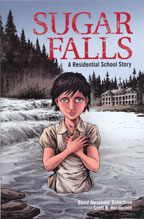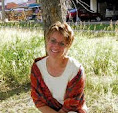In pursuit of the big idea 'perspective', I've been reading many middle grade novels like a mad woman . Last night I gobbled up Sugar Falls: a residential school story by David Alexander Robertson (823 R545S8 FIC).
This short graphic novel is a gem. In 40 pages we come to know Betsy, a little girl taken in by a loving family after her mother abandons her. In time, Betsy's foster father tries to prepare her for when she will go to a residential school run by Catholic priests and nuns. He does not say "you will have to go to a residential school" but tries to warn her that a dark time will come and that she has the strength and resiliency to endure. She must remember who she is, connections to her family, and her culture.
Betsy's time at the residential school is horrible, to bluntly understate it. The teachers are cruel and abusive. Betsy is slapped and kicked by a nun when she doesn't get her Latin right or speaks Cree. Sexual abuse is touched on, as well, but not too graphically. The priest enters the girls' dormitory at night and leads one of them away. Betsy's friend Flora counsels her to close her mind, numb her body and pretend it was 'only' a nightmare.
The story is told from the perspective of Betsy as an adult. She's telling her story to her niece and her niece's friend, who has been given a school assignment to interview a survivor of the residential school system. Betsy has survived her experience and motivated her to become a teacher of Cree and a language consultant.
Now back to perspective. A couple of questions given to me to think about were What shapes our perspectives? How do perspectives change over time [as in a historical context]?
I think Sugar Falls provides insight into both of these questions. An experience like the one Betsy lives through would certainly shape many aspects of her life. Betsy's own mother had been through the residential school system and came out damaged enough to be unable to care for her daughter. These are defining moments without a doubt.
Also, we can make comparisons between contemporary times and times when residential schools were prevalent in Canada (roughly 1840s to mid 1990s). Historically, it was government policy to look for opportunities that would 'civilize' First Nations peoples. Removing children from their families and communities was one way that they could be Christianized and 're-educated' to be more white and less 'savage'. Today this policy is unconscionable.
For the teachers of Nellie McClung Elementary School this might be a book to consider. They had asked me for books about residential schools. This one may not be appropriate for their purpose but I will let them decide. Unpacking this with their students will take some work.
Other books that may be less contentious are:
Fatty Legs by Christy Jordan-Fenton
Shi-shi-etko by Nicola I. Campbell
Shin-chi's canoe by Nicola I. Campbell
My Name is Seepeetza by Shirley Sterling.














0 comments:
Post a Comment